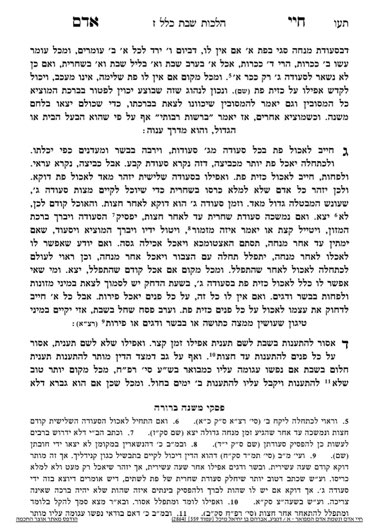The current series, which will cover seudos Shabbos and fasting on Shabbos, is available for sponsorship. Please contact Rabbi Reingold for more information.
We are continuing in siman 3, where the Chayei Adam is discussing the appropriate time for seudah shlishis. Today, we will clarify how shkia and bein hashmashos apply to seudah shlishis.
In siman 299, the halacha is brought that one is not allowed to eat or drink on motzai Shabbos before making havdalah, besides for water. This is important to keep in mind in general, and certainly at times such as motzai Yom Kippur, when, for example, a woman waiting at home for her husband to return from shul can drink water before hearing havdalah.
Even though one cannot begin a meal once the zman for havdalah has begun, one can continue a meal which began before the zman havdalah. There is an opinion that once the zman of havdalah comes, a person who began a meal before the zman must stop, but we do not follow that opinion. Rather, one may continue to eat and drink until they recite birchas hamazon.
If a person was only drinking before shkia, and had not sat down for a meal, once the zman for havdalah begins, arguably shkiah, they must make havdalah before continuing to drink. Since drinking does not have a kvius, each sip is considered on its own, so they must stop once the zman havdalah begins.
If a person is not being yotzei seudah shlishis with bread but rather mezonos or other foods, it is a machlokes whether they may continue after shkia. The Aruch Hashulchan assumes that a seudas keva is only through bread, and otherwise each bite is considered by itself, akin to drinking above. Once the zman havdalah takes effect, they are essentially beginning a new meal when they take their next bite, so they cannot eat until havdalah.
Nevertheless, it is an issur derabanan, so it may be possible to be meikil in the following situation. If a person missed shkia, there are opinions that one may not start the meal (even with bread). The Taz writes a person may begin the meal as long as it is still certainly bein hashmashos, but the Mishnah Berurah writes that multiple poskim disagree with the Taz. However, the Mishnah Berurah clarifies that they are discussing a person who was already yotzei seudah shlishis and wishes to begin a fourth meal. In such a case, he must begin before shkia according to the Mishnah Berurah. If one has not yet been yotzei seudah shlishis, we will be meikil in order to allow the person to fulfill the mitzvah and allow the person to begin as long as it is still bein hashmashos. Additionally, the opinion of Rabbeinu Tam is that bein hashmashos begins much later than we normally assume, and even according to the Geonim, there is another opinion in the Gemara which would also make it later. Thus, a person can be meikil after shkia as long as they are interested in eating seudah shlishis, as long as they are during bein hashmashos.
The Biur Halacha adds that even if one was yotzei seudah shlishis, it is part of the oneg on Shabbos not to walk around hungry, so if a person is hungry they can rely on all of the above shitos. If a person is not hungry and has no need to eat, they should refrain from eating from the zman of shkia.
If a person eats even one bite of bread before shkia, it is sufficient to allow them to continue with their meal.
Regarding the length of bein hashmashos, Rav Moshe held that in America, the equivalent of the Geonim’s opinion for bein hashmashos is 9 minutes. There are other opinions which hold the zman for bein hashmashos continues even longer, and a person may rely on them if needed.
If a person begins before shkia with only mezonos, fruit or other items, but they are eating it as their seudah shlishis, there is more of a reason to consider it a kvius, and they may be allowed to continue.
Summary
- If one ate bread for seudah shlishis, they may continue their meal after shkia. If one is only drinking, they may not continue drinking. If one is koveah seudah on mezonos, fruit or other foods, it is possible they can continue after shkia.
- Lechatchilla, one should begin before shkia. One can be meikil up to nine minutes after shkia in America. Other poskim allow one to start seuda shlishis even later.
- If one has already been yotzei seuda shlishis, but is hungry, they may rely on the previous heter as well.



